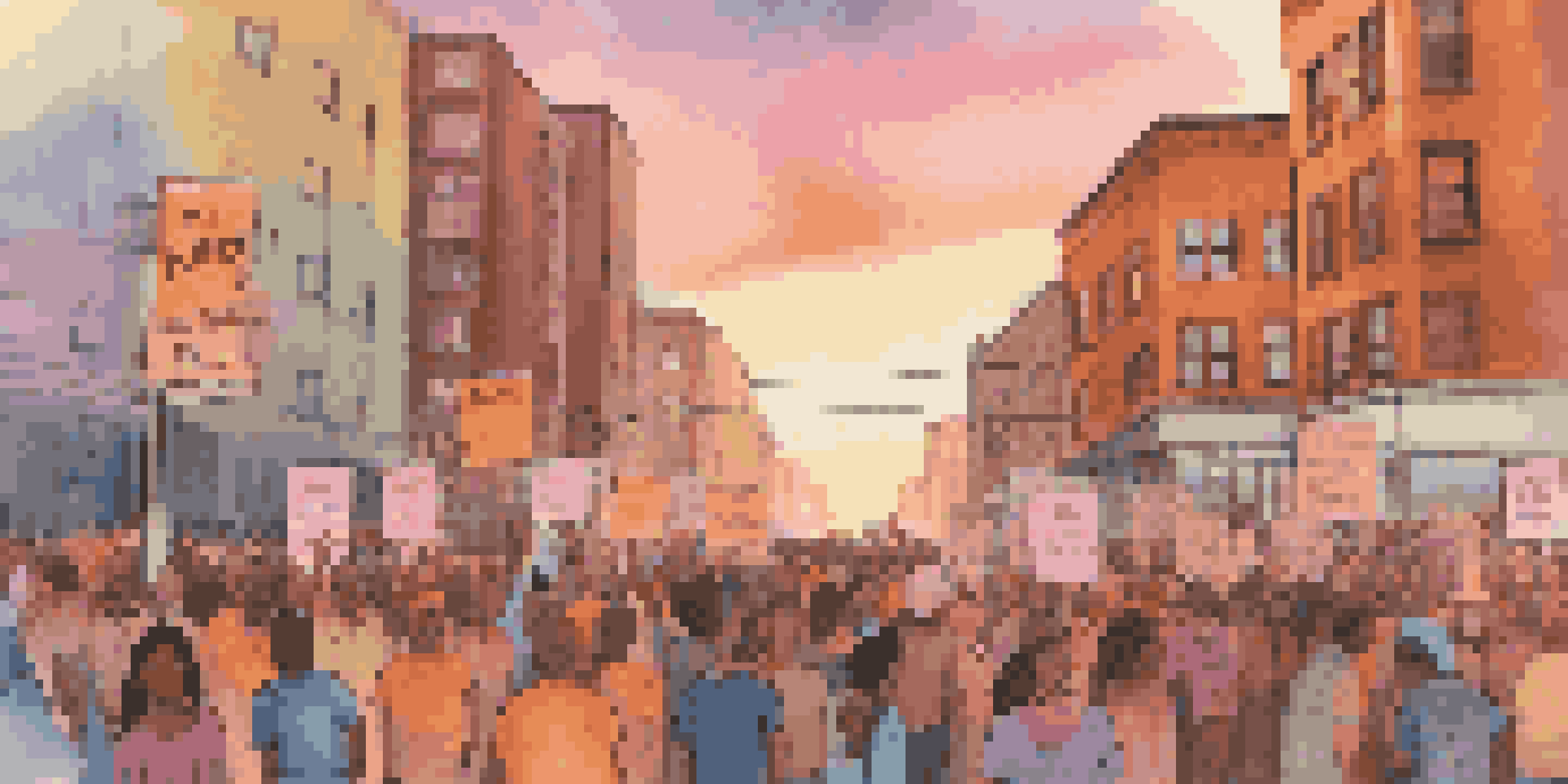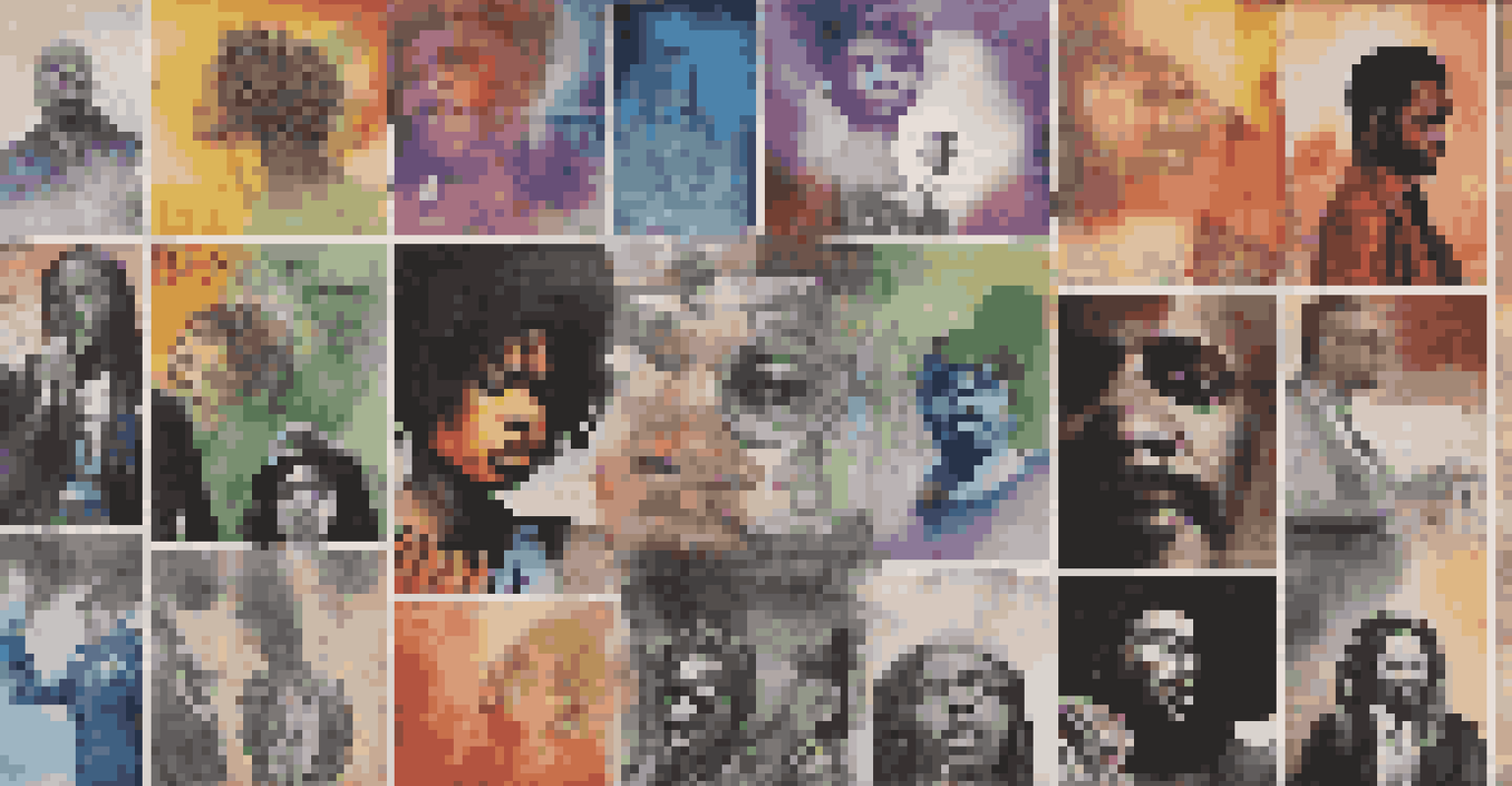The Cultural Significance of Protest Music in History

Understanding Protest Music: A Historical Overview
Protest music has long served as a powerful tool for social change, emerging in various forms throughout history. From folk ballads to rock anthems, these songs often reflect the struggles and aspirations of marginalized communities. They provide a voice to the voiceless, rallying individuals around common causes and igniting movements for justice.
Music can change the world because it can change people.
One of the earliest examples can be traced back to the labor movements in the early 20th century, where songs like 'Solidarity Forever' united workers in their fight for fair wages and labor rights. The music not only conveyed messages of resistance but also fostered a sense of community among those fighting for similar goals. This historical context sets the stage for how protest music has evolved over the decades.
As we delve further into its significance, we can see that protest music does more than entertain; it educates and informs listeners about the issues at hand. By blending storytelling with melody, artists create a lasting impact that resonates across generations.
Major Movements and Their Soundtracks
Throughout history, certain movements have become synonymous with specific protest songs that encapsulate their essence. For instance, the Civil Rights Movement of the 1960s produced powerful anthems like 'We Shall Overcome' that inspired hope and unity among activists. These songs often became rallying cries, sung at marches and gatherings, creating a sense of solidarity.

Similarly, the anti-war movement during the Vietnam War saw the rise of iconic tracks such as Bob Dylan’s 'Blowin' in the Wind.' These songs not only questioned the status quo but also resonated with the disillusionment of an entire generation. The music helped articulate the sentiments of those who felt unheard and marginalized during turbulent times.
Protest Music Empowers Change
Throughout history, protest music has served as a powerful tool for social change, giving voice to marginalized communities.
By examining these soundtracks of change, we can appreciate how music has the power to reflect societal sentiments and galvanize action. The relationship between music and activism is a testament to how art can influence the course of history.
The Role of Folk Music in Protest
Folk music has played a pivotal role in the history of protest music, often characterized by its storytelling nature and simplicity. Artists like Woody Guthrie and Joan Baez harnessed the power of folk to address social issues, making complex topics accessible to the masses. Their songs often drew from the experiences of ordinary people, allowing listeners to connect on a personal level.
The role of the artist is to make the revolution irresistible.
The folk revival of the 1960s, marked by the legacy of these artists, showcased how music could be a form of activism. Concerts became platforms for raising awareness about civil rights, poverty, and war, effectively merging entertainment with education. This grassroots approach created a sense of empowerment among listeners, encouraging them to take action in their own communities.
As we consider the impact of folk music, it becomes clear that its simplicity is its strength. By stripping down complex issues to relatable narratives, folk protest music continues to inspire new generations of activists.
Rock and Punk: A Raw Response to Injustice
The rock and punk genres emerged in the late 20th century as a raw, rebellious response to societal injustices. Bands like The Clash and Rage Against the Machine used their music to challenge political systems and highlight issues such as war, inequality, and corruption. Their energetic and often aggressive sound captured the frustration of youth disillusioned with authority.
Punk music, in particular, became an outlet for expressing anger and dissent, with lyrics that were often unapologetically confrontational. Songs like 'Killing in the Name' not only critiqued systemic racism but also encouraged listeners to question their own complicity in societal injustices. This unfiltered expression of emotion resonated deeply with fans, creating a powerful movement.
Genres Unite for Justice
Different music genres, from folk to hip-hop, have played significant roles in social movements, reflecting societal sentiments and galvanizing action.
The legacy of rock and punk protest music reveals how artists can influence cultural conversations and motivate action. These genres remind us that music can be a catalyst for change, empowering individuals to stand up against injustices in their own lives.
Hip-Hop: A Voice for the Marginalized
Hip-hop has emerged as one of the most significant forms of protest music in modern history, giving voice to marginalized communities across the globe. Artists like Public Enemy and N.W.A. have used their platforms to address systemic racism, police brutality, and social inequality. Through powerful lyrics and compelling beats, hip-hop artists articulate the struggles faced by their communities.
The genre's roots in storytelling and rhythm make it a potent medium for social commentary. Tracks like 'Fight the Power' not only highlight injustices but also motivate listeners to take a stand against oppression. This ability to blend personal narratives with broader societal issues creates an impactful listening experience.
As hip-hop continues to evolve, it remains a vital tool for activism, reflecting the realities of life in marginalized communities. Its cultural significance lies in its capacity to inspire change and foster dialogue around pressing social issues.
Women in Protest Music: Amplifying Voices
Women have played a crucial role in protest music, often using their art to challenge gender norms and advocate for equality. From the folk music of Joan Baez to the punk anthems of Bikini Kill, female artists have been at the forefront of movements that seek to amplify marginalized voices. Their contributions highlight the intersectionality of social justice, addressing not just race or class, but gender as well.
Songs like 'I Will Survive' by Gloria Gaynor have transcended generations, empowering women to reclaim their narratives and assert their rights. Such tracks resonate not only as personal anthems but also as collective calls for change, inspiring women to unite in their struggles. This blend of personal and political is a hallmark of protest music that is often overlooked.
Future Voices in Activism
New generations of artists are blending genres and using technology to amplify messages of social justice, ensuring the relevance of protest music continues.
As we recognize the impact of women in protest music, we see how their voices add depth to the conversation around equality and justice. Their stories and experiences enrich the narrative of activism, making it more inclusive and representative of diverse perspectives.
The Future of Protest Music: A New Generation of Voices
As we look to the future of protest music, it’s clear that new generations of artists are continuing this powerful tradition. Genres are blending, and technology is enabling a wider reach, allowing messages of social justice to resonate globally. Platforms like social media have transformed how music is shared and consumed, making it easier for artists to connect with audiences.
Contemporary artists like Billie Eilish and H.E.R. address issues such as climate change and racial injustice, utilizing their platforms to raise awareness and inspire action. Their music often combines personal experience with broader societal themes, creating a compelling narrative that speaks to today’s challenges. This evolution of protest music showcases its adaptability and relevance in an ever-changing world.

Ultimately, the future of protest music lies in its ability to evolve and resonate with new audiences. As long as there are injustices to address, artists will continue to use their voices to inspire change, ensuring that protest music remains a vital part of our cultural landscape.